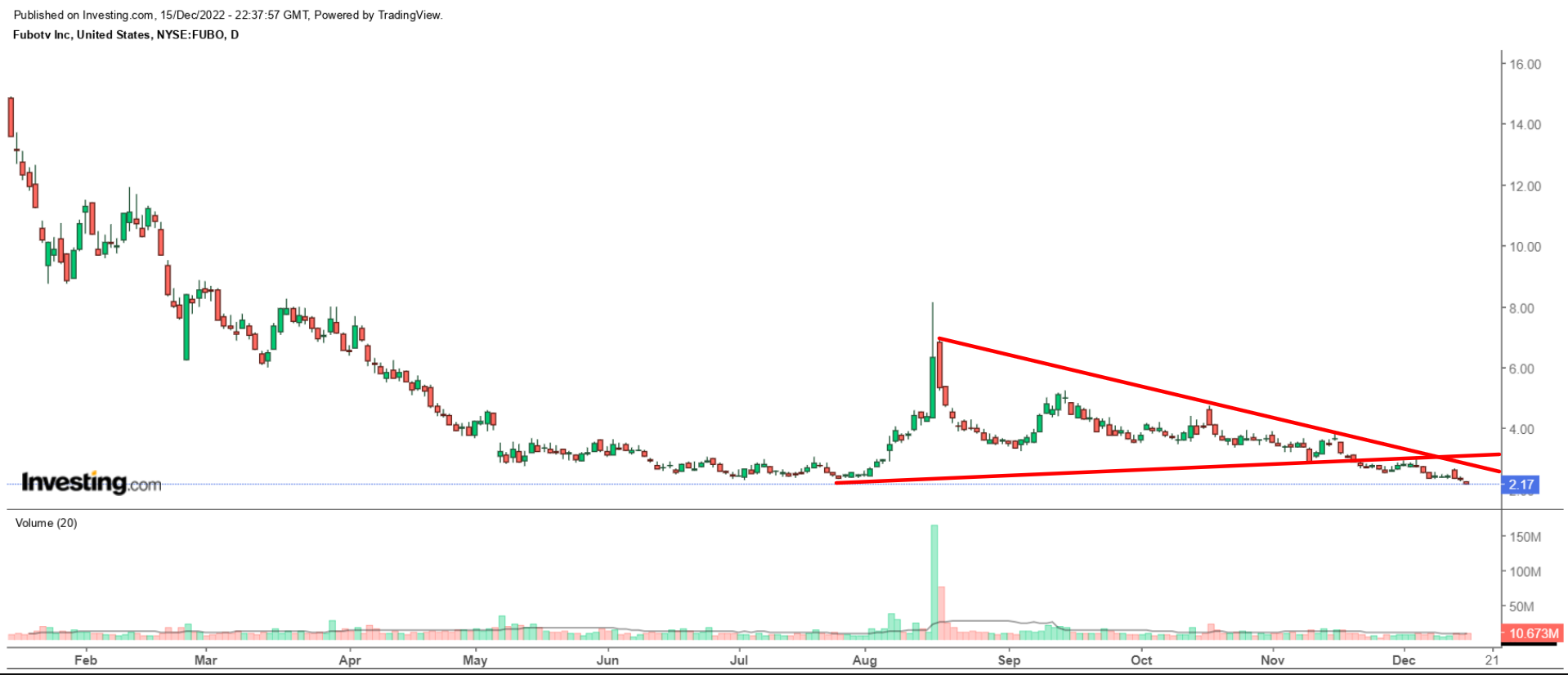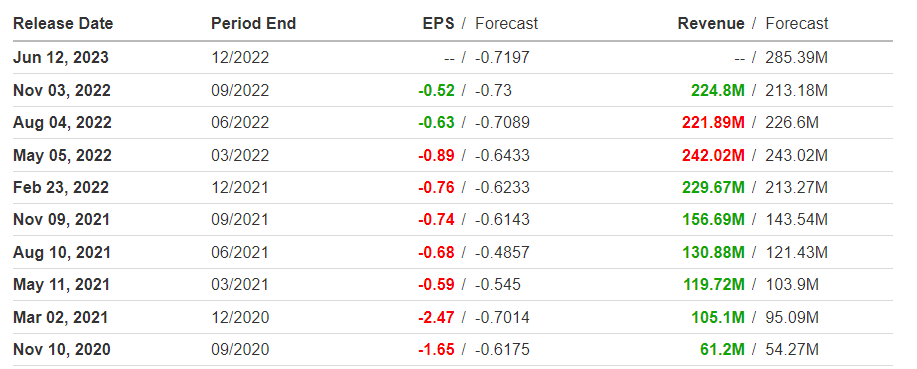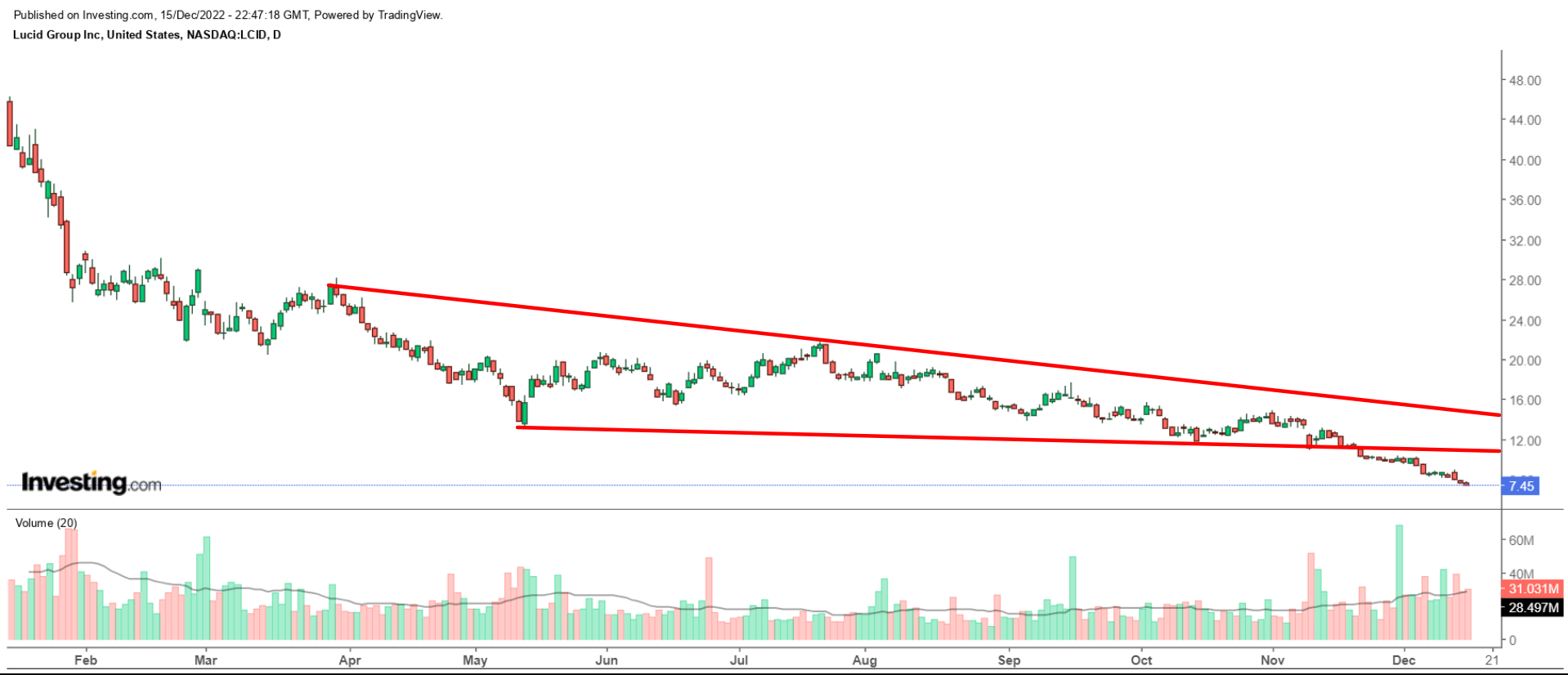- The Federal Reserve delivered another rate hike this week and signaled further tightening in 2023 as it tries to bring down inflation.
- Higher rates will lead to further market turmoil, especially in non-profitable high-growth stocks.
- Shares of live-sports streaming platform FuboTV and electric vehicle maker Lucid Motors remain vulnerable.
- Year-To-Date Performance: -86%
- Percentage From ATH: -96.5%
- Market Cap: $423.8 million
- Year-To-Date Performance: -80.4%
- Percentage From ATH: -88.5%
- Market Cap: $12.5 billion
The Dow Jones Industrial Average, S&P 500, and Nasdaq are all on track to suffer their biggest yearly percentage drop since the financial crisis of 2008, as fears intensified that the Federal Reserve’s battle against inflation using aggressive interest rate hikes could lead to a deep recession.
The U.S. central bank raised rates by half a percentage point earlier this week and projected at least an additional 75 basis points of increases in borrowing costs by the end of 2023. Fed Chair Jerome Powell warned that he would continue to raise interest rates next year even as the economy slips towards a possible recession.
Given the hawkish Fed outlook, shares of live-sports streaming platform FuboTV and electric vehicle maker Lucid Motors remain vulnerable to the additional downside in the months ahead.
1. FuboTV
FuboTV (NYSE:FUBO) has seen its stock collapse to a series of new record lows in recent sessions as investors continue to worry over the negative impact of several fundamental and macroeconomic-related headwinds plaguing the struggling sports-focused streaming service.
With less than two weeks to go until the end of the year, FUBO shares are down a whopping 86% in 2022 amid an aggressive reset in valuations across the frothy tech space sparked by the Fed’s continued plans to tighten monetary policy.
FuboTV’s stock began trading at around $10 in October 2020 after the New York-based streaming platform went public through a special purpose acquisition company (SPAC). It soared to a record peak of $62.29 in December 2020 before crashing 96.5% to trade at about $2 per share as of Thursday evening.
At current levels, the former SPAC darling has a market cap of $423.8 million. At its peak, it was valued at more than $5 billion.

I believe shares of the money-losing live-sports streaming company remain vulnerable to further losses in 2023 amid worries over its high cash burn related to spending on live sports content.
The sports-centric streaming service has been going through cash at an alarming rate, using over $294 million through the first three quarters of 2022. That leaves it with $307.4 million on its balance sheet as of the end of September.
For a company that doesn't forecast being cash flow positive until 2025, there is a legitimate fear that FuboTV could run out of money by the end of next year as it continues to spend heavily on acquiring the rights to sports content in an effort to attract subscribers.
FuboTV lost $152.7 million, or $0.52 a share, in Q3, worsening from a net loss of $105.9 million in the year-ago period, due primarily to rising operating expenses and higher spending on live sports deals. The company has now reported a net loss in every quarter since going public, dating back to Q3 2020.
Taking that into consideration, I remain pessimistic about FuboTV’s growth prospects, with either an equity raise or outright failure looking like the most probable outcomes as the company struggles to get its expenses under control. Next year could be another difficult one, which is why I think FUBO stock should be avoided at all costs.
2. Lucid
After going public in the midst of 2021’s soaring tech IPO and SPAC market, Lucid Group (NASDAQ:LCID) has fallen out of favor this year amid a general selloff in non-profitable high-growth companies that have lofty price-to-earnings ratios, especially those in the electric vehicle sector.
After rallying to a record high of $64.86 in February 2021, LCID stock - which is down 80.4% year-to-date - tumbled rapidly to a low of $7.45 yesterday. At current levels, the Newark, California-based EV company - whose shares stand 88.5% below their all-time peak - has a market cap of $12.5 billion.
Despite the months-long selloff, Lucid stock remains overvalued as it trades at more than 33 times this year’s sales, making it a less attractive option amid the current market environment.
In addition, the amount of cash Lucid is burning to stay competitive with Tesla (NASDAQ:TSLA), Ford (NYSE:F), General Motors (NYSE:GM), Volkswagen (ETR:VOWG_p) and other legacy automakers in the EV market is a cause of growing concern. Lucid ended the third quarter with $3.85 billion in cash, which is expected to fund the company at least into Q4 2023.
As a result, the company delivered worse-than-expected third-quarter financial results last month, missing on both the top and bottom lines due to a challenging operating environment.
The company’s net loss widened to $670.2 million, or $0.40 per share, from $524.4 million, or $0.43 per share, in the year-ago period. It has yet to turn a profit in its short history as a publicly traded company. Revenue totaled $195.5 million, trailing estimates for sales of $210.7 million as it delivered 1,398 vehicles.
Non-profitable companies with high cash burn rates are dangerous in any market - but today, more than ever. While LCID shares will not fall to zero, the months ahead will be pivotal in determining the long-term prospects of the beleaguered electric vehicle manufacturer.
In a troubling sign, future order reservations for its electric car models fell in the third quarter from the second, in part due to canceled orders and people fearing long waiting periods. The luxury EV maker said it had more than 34,000 orders in Q3, down 3,000 reservations from the preceding quarter.
Disclosure: At the time of writing, Jesse is short on the S&P 500 and Nasdaq 100 via the ProShares Short S&P 500 ETF (SH) and ProShares Short QQQ ETF (PSQ).
The views discussed in this article are solely the opinion of the author and should not be taken as investment advice.
